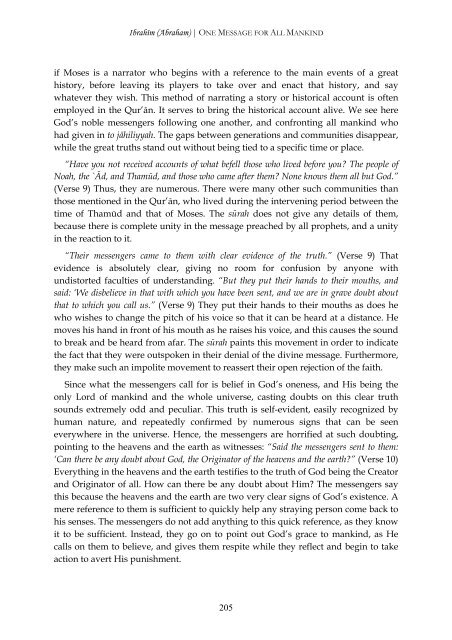Volume 10 Surah 12 - 15 - Enjoy Islam
Volume 10 Surah 12 - 15 - Enjoy Islam
Volume 10 Surah 12 - 15 - Enjoy Islam
You also want an ePaper? Increase the reach of your titles
YUMPU automatically turns print PDFs into web optimized ePapers that Google loves.
Ibrahīm (Abraham) | ONE MESSAGE FOR ALL MANKIND<br />
if Moses is a narrator who begins with a reference to the main events of a great<br />
history, before leaving its players to take over and enact that history, and say<br />
whatever they wish. This method of narrating a story or historical account is often<br />
employed in the Qur’ān. It serves to bring the historical account alive. We see here<br />
God’s noble messengers following one another, and confronting all mankind who<br />
had given in to jāhiliyyah. The gaps between generations and communities disappear,<br />
while the great truths stand out without being tied to a specific time or place.<br />
“Have you not received accounts of what befell those who lived before you? The people of<br />
Noah, the `Ād, and Thamūd, and those who came after them? None knows them all but God.”<br />
(Verse 9) Thus, they are numerous. There were many other such communities than<br />
those mentioned in the Qur’ān, who lived during the intervening period between the<br />
time of Thamūd and that of Moses. The sūrah does not give any details of them,<br />
because there is complete unity in the message preached by all prophets, and a unity<br />
in the reaction to it.<br />
“Their messengers came to them with clear evidence of the truth.” (Verse 9) That<br />
evidence is absolutely clear, giving no room for confusion by anyone with<br />
undistorted faculties of understanding. “But they put their hands to their mouths, and<br />
said: ‘We disbelieve in that with which you have been sent, and we are in grave doubt about<br />
that to which you call us.” (Verse 9) They put their hands to their mouths as does he<br />
who wishes to change the pitch of his voice so that it can be heard at a distance. He<br />
moves his hand in front of his mouth as he raises his voice, and this causes the sound<br />
to break and be heard from afar. The sūrah paints this movement in order to indicate<br />
the fact that they were outspoken in their denial of the divine message. Furthermore,<br />
they make such an impolite movement to reassert their open rejection of the faith.<br />
Since what the messengers call for is belief in God’s oneness, and His being the<br />
only Lord of mankind and the whole universe, casting doubts on this clear truth<br />
sounds extremely odd and peculiar. This truth is self-evident, easily recognized by<br />
human nature, and repeatedly confirmed by numerous signs that can be seen<br />
everywhere in the universe. Hence, the messengers are horrified at such doubting,<br />
pointing to the heavens and the earth as witnesses: “Said the messengers sent to them:<br />
‘Can there be any doubt about God, the Originator of the heavens and the earth?” (Verse <strong>10</strong>)<br />
Everything in the heavens and the earth testifies to the truth of God being the Creator<br />
and Originator of all. How can there be any doubt about Him? The messengers say<br />
this because the heavens and the earth are two very clear signs of God’s existence. A<br />
mere reference to them is sufficient to quickly help any straying person come back to<br />
his senses. The messengers do not add anything to this quick reference, as they know<br />
it to be sufficient. Instead, they go on to point out God’s grace to mankind, as He<br />
calls on them to believe, and gives them respite while they reflect and begin to take<br />
action to avert His punishment.<br />
205

















